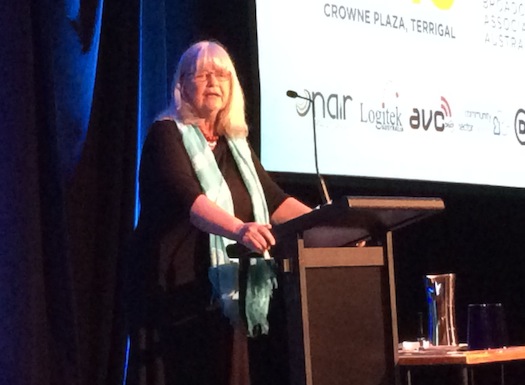Delivering the keynote address at the 2015 CBAA Conference, journalist Wendy Bacon spoke about the importance of community broadcasting.
“The diversity of community radio is so valuable in a country like ours, which really does not have a democratic media… The most democratic thing in our media is probably community radio.
“People can speak for themselves, not just speak through professional media. This is a powerful positive tendency in our society.”
She echoed the sentiments of other speakers urging the sector to cling to its community roots, but also to adapt to the rapid changes in technology.
Looking back to the beginnings of community radio in the 1970s she said:
“It is timely to think about the beginnings of the movement, which coincided with the dismissal of Gough Whitlam in 1975.
“Up until the 1960s there were major things that just were not reported in the Australian media, such a the systematic bashing of prisoners in jails. It was quite a repressive time in media. In the 1970s things changed and community radio was a part of that.”
Since leaving the tertiary teaching sector, Wendy Bacon now regards herself as an activist citizen journalist and publishes a blog at WendyBacon.com. She covers issues that are not being covered in mainstream media.
Gender is one issue she thinks should be better covered and addressed in media.
“You would expect that half the voices and half the coverage would be about women, but it’s not. ABC and Commercial media is still extremely male dominated. While you may see and hear more women in media, look a bit deeper… who is the executive producer and who is in management. it is still very male dominated… Community radio does enable women’s voices and empowers them by giving them airtime.”
She urged broadcasters to look for the hidden stories. “In the past, stories that would have got a half page in the newspapers are now just not getting coverage at all,” said Bacon discussing the shrinking nature of commercial media.
“One example of that is the problem of Crown Land being set aside for community purposes now being handed over to private interests. This is happening everywhere and there are people organising to defend that land, but there is very little coverage of this issue. It is happening in Paddington, it’s happening here in the Gosford are and all over the country.
“When I was an investigative journalist I would have been working on this as a big story, but there is little coverage now. I have been able to talk about this story on community radio and on my blog…
“What is so valuable about what community radio can do is give people the space to speak. We don’t want to impose a mainstream journalism model on community radio. That model truncates and manipulates the coverage, but community radio has the space not to do that.”
Talking about journalism Bacon said “no journalist can be totally unbiassed, there is always a stance.” Her view is that Australia needs more activist journalism, but activist journalists “must acknowledge where you are coming from, then just go ahead and tell a story.”
“There is a huge role here for community radio,” she said.
“There has been so many journalistic resources lost in the past 20 years. Working on stories for a few days rarely happens anymore. Some of you who work in community media may have the time and effort to devote to deeper research and looking for stories that are not covered elsewhere. There are many marginalised groups in our society who need your coverage.”

